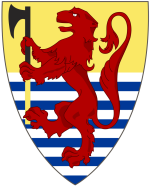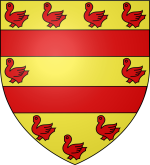The Marshals of Britain
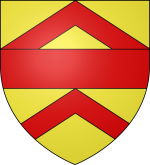
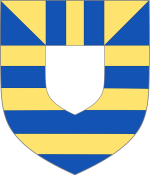
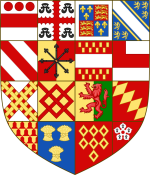
The four-year civil war for the throne of England between Stephen of Blois and Empress Matilda ended after the self-proclaimed Lady of the English surrendered to Stephen at Oxford in 1142. However, the destructive civil war had shattered the prestige and authority of the crown. Proving himself unable to reassert his authority over his unruly nobles, King Stephen and his heirs soon found themselves at the mercy of their vassals, reduced to mere figureheads as the nobles fought amongst themselves for political supremacy.
In 1192, Lord Walter Fitz Robert of Woodham Walter gained ascendancy over other nobles. Seizing power over England, Walter became king in all but name. However, Walter did not depose the king, nor did he assume any position in the civilian government of the realm. Instead, he ruled from his power base, Baynard's Castle in the City of London, and styled himself Marshal of the Army of God and the Holy Church.
Marshal Walter died in 1198, leaving a hereditary military dictatorship, commonly referred to as the Marshalcy, as his legacy.
Three great noble houses; Fitzwalter, Mortimer and Devereux, would go on to hold the Marshalcy until its final demise in 1867.
Fitzwalter Marshalcy (1192-1333)
1292–1298: Walter Fitz Robert
1298-1219: Robert I Fitzwalter
1226–1244: Robert II Fitzwalter
1244–1252: Robert III Fitzwalter
1252–1266: Lord Edward
1266–1274: Lord Henry
1274–1284: Lord Alphonso
1284–1289: Lord Henry
1289–1296: Lord Edmund
1296–1318: Lord Thomas
1318–1333: Lord Henry
King William III's attempts to reassert royal authority failed when Lord Roger Mortimer, an erstwhile supporter of King William, turned against him and marched against the king. After being defeated by Mortimer's forces, William abdicated the throne and went into exile. As the first marshalcy had fallen and William III's attempt at a rpyal restoration had ended in failure, Mortimer found himself the undisputed master of England. After installing a royal family member on the throne as his puppet, Mortimer took the Marshalcy for himself. Roger Mortimer and his descendants would rule as marshals until the 16th century.
Mortimer Marshalcy (1336-1573)
1337–1340: Roger I Mortimer
1340–1360: Roger II Mortimer
1360–1381: Edmund I Mortimer
1381–1394: Roger III Mortimer
1394–1423: Edmund II Mortimer
1423–1441: Richard I Mortimer
1441–1474: Edward I Mortimer
1474–1493: Edward II Mortimer
1493–1508: Richard II Mortimer
1508–1521: Edward II Mortimer
1521–1545: Richard III Mortimer
1545–1565: Richard IV Mortimer
1565–1568: Richard V Mortimer
1568–1573: Richard VI Mortimer
Although William III and his army were vanquished by Roger Mortimer in 1336, the king did not leave quietly. Having fled London, William refused to recognise the Mortimer marshals and their puppet king. Instead, William set up a rival court in Oxford, from where William and his successors attempted to reassert control over the realm. The Oxford Court held out until 1392, when King John II surrendered to the Mortimer Marshalcy and the London Court.
The Mortimers were now the undisputed rulers of England, but they proved unable to keep their powerful and ambitious vassals at bay. From 1467 to 1477, England was ravaged by the Bertrandine War, a civil war between powerful noble families. The war ushered in a century of civil wars between noble families. This destructive period of internecine warfare, referred to at the time as the Hundred Years' Anarchy, shattered the authority of the Mortimer Marshalcy. The once mighty marshals soon found themselves reduced to mere puppets of the warring nobles. Richard VI, the last Mortimer marshal, was finally deposed in 1573 by the powerful lord Robert Dudley, who would seize power in London in his quest to crush the warring nobles and unify the realm.
Kenilworth-Sherborne period (1573-1601)
1573–1582: Robert Dudley
1582–1601: Walter Raleigh
Having seized power and deposed the Mortimer marshals, Robert Dudley did not assume the position of Marshal, instead holding the position of Lord Chancellor. Dudley spent the next decade asserting his authority over England by force of arms, until his death at the hands of his retainer, Sir Francis Drake, in Westminster Abbey in 1582. After the assassination of Dudley, Sir Walter Raleigh became the new ruler of England. Raleigh, a partisan of Dudley, continued Dudley's attempts to unite England. He did also not assume the position of Marshal, preferring the offices of Secretary of State and Lord Chancellor.
Raleigh's position was heavily damaged after two failed invasions of the Netherlands. In 1601, Lord Robert Devereux rebelled against Raleigh. Devereux defeated and killed Raleigh in battle, and went on to become the new ruler of the realm. In 1604, Devereux assumed the office of Marshal. Robert and his descendants would once again rule over a unified realm as the last noble family to hold the Marshalcy of Britain.
Devereux Marshalcy (1603-1867)
1603–1648: Robert I Devereux
1648–1656: Walter Devereux
1656–1683: Leicester Devereux
1683–1700: Edward I Devereux
1700–1740: Price I Devereux
1740–1748: Price II Devereux
1748–1760: Edward II Devereux
1760–1783: Edward III Devereux
1783–1804: George Devereux
1804–1843: Henry Devereux
1843–1867: Robert II Devereux
The Devereux marshals governed Britain from their power base in Chartley Castle in Staffordshire, controlling foreign and domestic policy, the military and the feudal nobility. The marshals pursued an isolationist foreign policy, aimed withdrawing from the affairs of Continental Europe and avoiding foreign entanglements. The Marshalcy severed ties with the Roman Catholic Church, appointing the King head of the Church of England. The marshals left the administration of the realm to the nobility, leaving each noble family to administrate a feudal domain. During the Devereux Marshalcy, Britain experienced rapid economic growth and urbanisation.
The Devereux Marshalcy declined when their isolationist policy proved increasingly unsustainable. After a brief naval conflict with France in 1853, several influential nobles began to plot against the marshalcy, intending to end the military rule of the Devereux family and reform British society under the personal rule of a strong king. The fatal weakening of the marshalcy finally resulted in the resignation of the last marshal, Robert II Devereux in 1867. 264 years of Devereux rule did not end quietly, however, as nobles loyal to the former marshalcy rebelled against the new royal government. The civil war, commonly known as the War of 1867, proved to be the last disturbance of feudal Britain against the new absolute monarchy. After the defeat of the rebels, the old marshalcy was finally abolished as King Arthur II began his personal rule.



The four-year civil war for the throne of England between Stephen of Blois and Empress Matilda ended after the self-proclaimed Lady of the English surrendered to Stephen at Oxford in 1142. However, the destructive civil war had shattered the prestige and authority of the crown. Proving himself unable to reassert his authority over his unruly nobles, King Stephen and his heirs soon found themselves at the mercy of their vassals, reduced to mere figureheads as the nobles fought amongst themselves for political supremacy.
In 1192, Lord Walter Fitz Robert of Woodham Walter gained ascendancy over other nobles. Seizing power over England, Walter became king in all but name. However, Walter did not depose the king, nor did he assume any position in the civilian government of the realm. Instead, he ruled from his power base, Baynard's Castle in the City of London, and styled himself Marshal of the Army of God and the Holy Church.
Marshal Walter died in 1198, leaving a hereditary military dictatorship, commonly referred to as the Marshalcy, as his legacy.
Three great noble houses; Fitzwalter, Mortimer and Devereux, would go on to hold the Marshalcy until its final demise in 1867.
Fitzwalter Marshalcy (1192-1333)
1292–1298: Walter Fitz Robert
1298-1219: Robert I Fitzwalter
1226–1244: Robert II Fitzwalter
1244–1252: Robert III Fitzwalter
1252–1266: Lord Edward
1266–1274: Lord Henry
1274–1284: Lord Alphonso
1284–1289: Lord Henry
1289–1296: Lord Edmund
1296–1318: Lord Thomas
1318–1333: Lord Henry
The descendants of Walter Fitz Robert would go on to hold the Marshalcy for almost 150 years, leaving the king as a mere figurehead. However, the Fitzwalters soon became figureheads themselves. After the death of Robert I, the second marshal, the Longespée family seized power in the realm. They did not usurp the marshalcy, instead holding the office of Lord High Steward. This arrangement lasted for over a century, until the ambitious King William III engineered its collapse. King William was not content to reign in name only, like his predecessors had. In 1333, the king finally succeeded in his attempt to depose both the Longespée stewards and the Fitzwalter marshals, ushering in a period of personal rule, commonly known as the Williamite Restoration.King William III's attempts to reassert royal authority failed when Lord Roger Mortimer, an erstwhile supporter of King William, turned against him and marched against the king. After being defeated by Mortimer's forces, William abdicated the throne and went into exile. As the first marshalcy had fallen and William III's attempt at a rpyal restoration had ended in failure, Mortimer found himself the undisputed master of England. After installing a royal family member on the throne as his puppet, Mortimer took the Marshalcy for himself. Roger Mortimer and his descendants would rule as marshals until the 16th century.
Mortimer Marshalcy (1336-1573)
1337–1340: Roger I Mortimer
1340–1360: Roger II Mortimer
1360–1381: Edmund I Mortimer
1381–1394: Roger III Mortimer
1394–1423: Edmund II Mortimer
1423–1441: Richard I Mortimer
1441–1474: Edward I Mortimer
1474–1493: Edward II Mortimer
1493–1508: Richard II Mortimer
1508–1521: Edward II Mortimer
1521–1545: Richard III Mortimer
1545–1565: Richard IV Mortimer
1565–1568: Richard V Mortimer
1568–1573: Richard VI Mortimer
Although William III and his army were vanquished by Roger Mortimer in 1336, the king did not leave quietly. Having fled London, William refused to recognise the Mortimer marshals and their puppet king. Instead, William set up a rival court in Oxford, from where William and his successors attempted to reassert control over the realm. The Oxford Court held out until 1392, when King John II surrendered to the Mortimer Marshalcy and the London Court.
The Mortimers were now the undisputed rulers of England, but they proved unable to keep their powerful and ambitious vassals at bay. From 1467 to 1477, England was ravaged by the Bertrandine War, a civil war between powerful noble families. The war ushered in a century of civil wars between noble families. This destructive period of internecine warfare, referred to at the time as the Hundred Years' Anarchy, shattered the authority of the Mortimer Marshalcy. The once mighty marshals soon found themselves reduced to mere puppets of the warring nobles. Richard VI, the last Mortimer marshal, was finally deposed in 1573 by the powerful lord Robert Dudley, who would seize power in London in his quest to crush the warring nobles and unify the realm.
Kenilworth-Sherborne period (1573-1601)
1573–1582: Robert Dudley
1582–1601: Walter Raleigh
Having seized power and deposed the Mortimer marshals, Robert Dudley did not assume the position of Marshal, instead holding the position of Lord Chancellor. Dudley spent the next decade asserting his authority over England by force of arms, until his death at the hands of his retainer, Sir Francis Drake, in Westminster Abbey in 1582. After the assassination of Dudley, Sir Walter Raleigh became the new ruler of England. Raleigh, a partisan of Dudley, continued Dudley's attempts to unite England. He did also not assume the position of Marshal, preferring the offices of Secretary of State and Lord Chancellor.
Raleigh's position was heavily damaged after two failed invasions of the Netherlands. In 1601, Lord Robert Devereux rebelled against Raleigh. Devereux defeated and killed Raleigh in battle, and went on to become the new ruler of the realm. In 1604, Devereux assumed the office of Marshal. Robert and his descendants would once again rule over a unified realm as the last noble family to hold the Marshalcy of Britain.
Devereux Marshalcy (1603-1867)
1603–1648: Robert I Devereux
1648–1656: Walter Devereux
1656–1683: Leicester Devereux
1683–1700: Edward I Devereux
1700–1740: Price I Devereux
1740–1748: Price II Devereux
1748–1760: Edward II Devereux
1760–1783: Edward III Devereux
1783–1804: George Devereux
1804–1843: Henry Devereux
1843–1867: Robert II Devereux
The Devereux marshals governed Britain from their power base in Chartley Castle in Staffordshire, controlling foreign and domestic policy, the military and the feudal nobility. The marshals pursued an isolationist foreign policy, aimed withdrawing from the affairs of Continental Europe and avoiding foreign entanglements. The Marshalcy severed ties with the Roman Catholic Church, appointing the King head of the Church of England. The marshals left the administration of the realm to the nobility, leaving each noble family to administrate a feudal domain. During the Devereux Marshalcy, Britain experienced rapid economic growth and urbanisation.
The Devereux Marshalcy declined when their isolationist policy proved increasingly unsustainable. After a brief naval conflict with France in 1853, several influential nobles began to plot against the marshalcy, intending to end the military rule of the Devereux family and reform British society under the personal rule of a strong king. The fatal weakening of the marshalcy finally resulted in the resignation of the last marshal, Robert II Devereux in 1867. 264 years of Devereux rule did not end quietly, however, as nobles loyal to the former marshalcy rebelled against the new royal government. The civil war, commonly known as the War of 1867, proved to be the last disturbance of feudal Britain against the new absolute monarchy. After the defeat of the rebels, the old marshalcy was finally abolished as King Arthur II began his personal rule.


